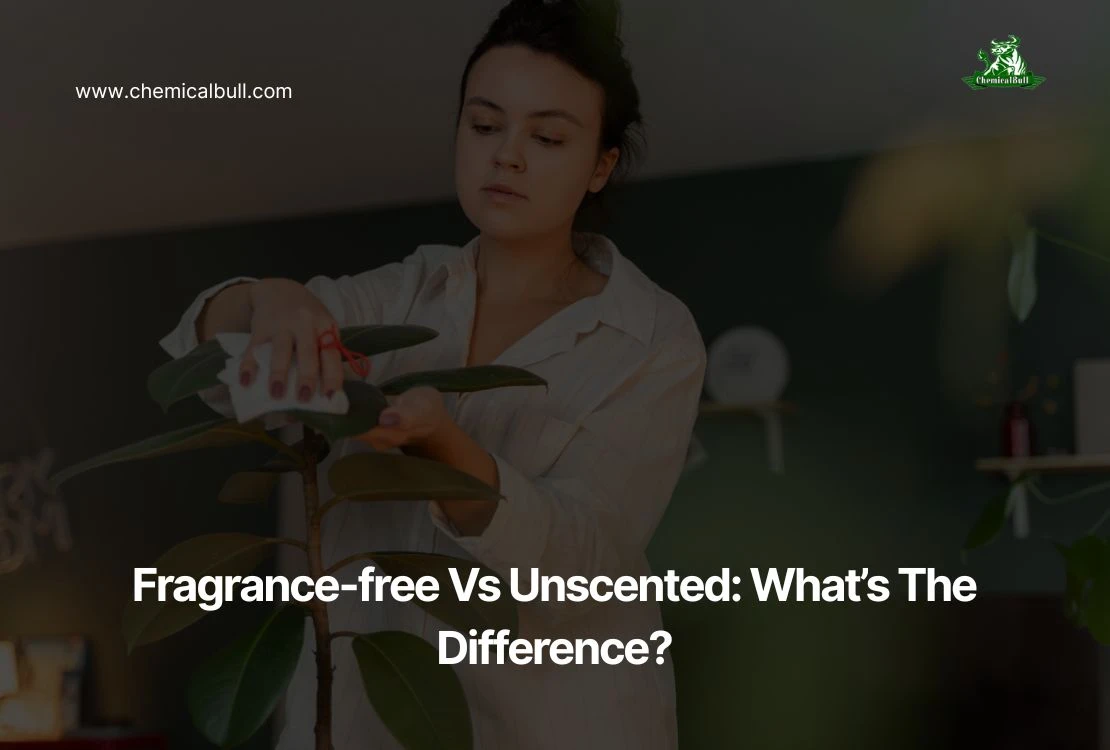Fragrance-free Vs Unscented: What’s The Difference?
What Does Fragrance-Free Mean?
A fragrance-free product means that no fragrance ingredients are intentionally added during formulation. This includes parfum, aroma chemicals, and essential oils used only to give scent. The product may still have a light natural smell from its raw materials, but no fragrance is added to cover or change it.
Fragrance-free products are commonly used in fragrance-free moisturizer, fragrance-free soap, fragrance-free shampoo, and fragrance-free deodorant, especially for fragrance-free products for sensitive skin and dermatology-focused products.
What Does Unscented Mean?
An unscented product is formulated to have little to no noticeable smell, but it may still contain fragrance ingredients—specifically masking agents.
This is why fragrance-free vs unscented smells can be different, even though both appear similar to consumers.
Masking agents are used to:
Neutralize unpleasant base odors from raw materials
Reduce the natural smell of surfactants, preservatives, or actives
Create a neutral sensory experience
fragrance-free and unscented smells like:
Fragrance-free → mild raw-material smell
Unscented → almost no smell
Fragrance-Free vs Unscented: Key Differences for B2B Buyers
Aspect | Fragrance-Free | Unscented |
Fragrance intentionally added | No | Sometimes |
Parfum in ingredient list | No | Possible |
Odour control method | No masking | Odour neutralisation |
Suitable for sensitive skin | Highly suitable | Depends on formulation |
Claim transparency | High | Can be confusing |
Use in dermatology products | Very common | Limited |
Do Unscented Products Contain Fragrance?
From a formulation point of view, unscented products may still contain fragrance-related ingredients, but only to neutralise or control odour. These ingredients are not added to give a pleasant smell, but to reduce the natural odour of raw materials.
So, do unscented products contain parfum?
In some instances, yes. Parfum may be used in very small amounts only for odour masking. Because of this, unscented does not always mean fragrance-free, and brands must be careful when making label claims.
Why Fragrance-Free Is Preferred for Sensitive Skin Products
Fragrance is one of the most common cosmetic irritants. Removing it completely helps:
Reduce allergic reactions
Minimise irritation
Improve product tolerance
This explains why fragrance-free is preferred when applied to sensitive skin products for both children and adults alike.
It also strengthens the fragrance-free meaning in skincare from a trust and safety perspective.
Fragrance-Free Chemicals Used in Cosmetic Formulation
To maintain performance without fragrance, formulators rely on functional ingredients such as:
Glycerin – hydration
Allantoin – skin soothing
Dimethicone – barrier protection
Cetearyl Alcohol – texture & stability
Glyceryl Stearate – emulsification
These Fragrance-Free Chemicals help deliver efficacy without irritation.
A trusted Cosmetic Raw Material Supplier helps brands ensure:
Verified fragrance-free inputs
Transparent documentation
Regulatory compliance
Unscented Chemicals and Odour Neutralisers
Unscented formulations often use:
Cyclodextrins – trap odour molecules
Zinc Ricinoleate – neutralises body odour
Propylene Glycol – solvent and carrier
These ingredients are widely used as odor neutralizers for cosmetics.
Explore applications here:
https://www.chemicalbull.com/applications
Role of Aroma Chemicals in Unscented Products
In unscented products, aroma chemicals are not used to create a pleasant fragrance. Instead, they may be added in very small amounts to help neutralise or control the natural smell of raw materials. These aroma-related ingredients work by reducing unwanted odours so the product feels neutral when used. This is why some unscented products may still list fragrance-related components, even though they do not smell perfumed. For brands and formulators, understanding this role is important to ensure correct labelling and to avoid confusion between fragrance-free and unscented claims.
To understand this difference better:
Growing Market Demand for Fragrance-Free Products
There is a rising demand for:
Fragrance-free skincare
Sensitive-skin formulations
Dermatologist-recommended products
This has increased sourcing needs for reliable fragrance-free raw materials.
Choosing the right option: buyer and consumer perspective
Choose fragrance-free products if:
You have highly sensitive or reactive skin
You are prone to allergies or irritation
You are using active-heavy or treatment products
You prefer minimal-risk formulations
Choose unscented products if:
You dislike noticeable fragrance
You do not have fragrance sensitivity
You want a neutral-smelling product without strong odor
The key is awareness—not assumption.
FAQs for Fragrance-Free vs Unscented
Can unscented products still contain fragrance ingredients?
Yes, many use masking agents or odour neutralisers in unscented products.Do fragrance-free products have any smell?
They may have a mild natural smell due to raw ingredients, but no fragrance is added intentionally.
Can unscented skincare still irritate sensitive skin?
Yes. Unscented products can contain fragrance components used for masking, which may still trigger irritation.Why do brands prefer fragrance-free claims?
They offer better transparency and trust.How should brands verify fragrance-free status?
By checking full ingredient documentation, youcan verify fragrance-free status.
Conclusion: Clarity Matters in Formulation and Claims
Clarity Is Key for Formulations and Claims. Understanding fragrance-free vs unscented is of crucial importance for cosmetic brands and manufacturers. Fragrance-free products eliminate fragrance ingredients entirely, while unscented ones focus more on masking odor than eliminating it completely.
By working with an experienced Cosmetic Raw Material Supplier and a dependable fragrance raw materials supplier, ChemicalBull (Group of Triveni Chemicals), create compliant, trustworthy, and high-performance products. As consumer awareness grows, clear formulation choices and honest labelling will continue to define successful skincare brands.

Pharmaceutical Grade Vs Industrial Grade Chemicals: Understanding The Essential Differences
14-Feb-2026

Sustainable Api Production: Green Chemistry, Continuous Flow Manufacturing And Strategic Sourcing
12-Feb-2026





